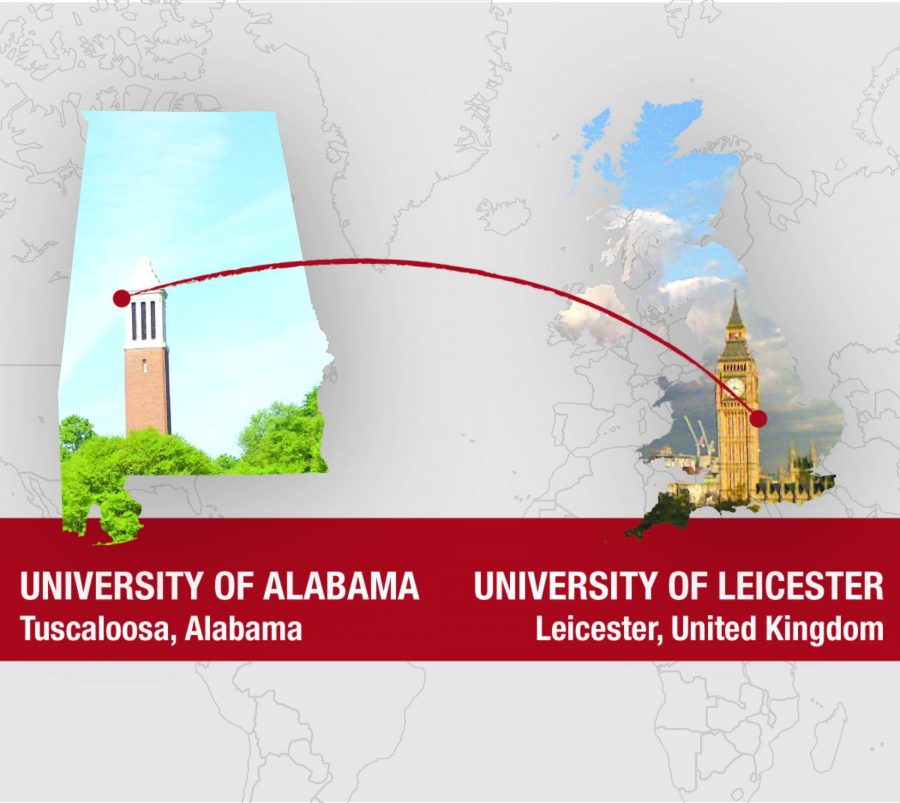“I had always told myself that I wanted to study abroad in college, and then I actually got the chance and I applied,” said Lewis, a senior majoring in secondary education. “Even if you’re scared [to study abroad], just go. Everyone’s in the same [situation], everyone is scared that you meet there that is going through the study abroad program, so you’re not alone.”
Nearly 4,300 miles from Tuscaloosa, Leicester is located in central England. The city is two and a half hours north of London and is approximately three and a half times bigger than Tuscaloosa. In 2013, the University of Leicester’s enrollment was 20,973.
The exchange program between the University of Leicester and The University of Alabama is one of more than 25 programs in 14 different countries. Exchange programs differ from affiliates or faculty-led programs in that the institution and its partner must maintain a balance of students exchanged between the schools.
Beth Williams, a junior majoring in English and history, is a counterpart from across the pond. Williams is a student from the University of Leicester and is currently participating in a year-long exchange. Her interest in Southern history eventually led her to the Capstone.
“Because I’m really interested in civil rights, I thought I’d want to come somewhere down South,” Williams said. “My top three [choices] were Alabama, LSU and Ole Miss, and halfway through the application process they told us that LSU and Ole Miss had both dropped out of the exchange this year. I had eight other universities that were scattered all around, but I really wanted to come here, and I was so lucky I did.”
Exchange students face the challenge of understanding and adjusting to cultural differences in their host country. Williams, a native of Birmingham, England, said she was stunned by the importance of football in Tuscaloosa.
“[Football] is like a religion here,” Williams said. “Everybody takes it so seriously. I’ve been to a couple games, and you go there and the atmosphere is amazing, and as soon as it starts I have no idea what’s going on, but I like it.”
Rachel Stewart, a junior majoring in American studies, is also in Tuscaloosa for a year from the University of Leicester. She was also shocked by the attention paid to football every week.
“The football craziness is amazing for an outsider, I’ve not seen anything that’s as important to the culture before,” Stewart said.
Williams said she has also found a drastic difference in the amount of school spirit here compared to her home school.
“University pride is a massive thing here,” Williams said. “We never really get that at home. Yeah, we have sports teams, and rugby is really big, but we just have one event once a year that everybody goes to and cheers them on, it’s not like a weekly thing.”
Lewis said she also experienced some level of cultural confusion while in England last spring. She expected an English exchange program to be a relatively easy adjustment, but was surprised at how different Leicester was from home.
“I chose England because I didn’t think there would be that much of a language barrier, and come to find out, there is,” Lewis said.
Lewis said understanding thick accents and even just different terminology across England was difficult, as was considering the exchange rate before making any purchases – 1 US Dollar equals about 0.62 British Pounds. Although the people in England speak English, dialects and slang differ on a vertical axis similarly to America’s North-South cultural divide.
Lewis said academics at the University of Leicester were more independent than most classes at the University. Some of her classes in Leicester consisted of only a test or an essay, were heavily based on group discussions and required little to no daily or weekly homework. Lewis said she was thankful to find kindness in the locals she befriended abroad.
“Everyone seemed really welcoming to me as an international student, so that was nice,” Lewis said. “I lived with English students and they were all really great too if I needed help with something, because schooling was a lot different over there.”
The nature of the selection process gives exchange students a certain level of prestige, said Chad Berry, assistant director of the UA study abroad office. The application, found at studyabroad.ua.edu, requires a statement of purpose, a resume and at least a 3.0 GPA. After the student is accepted by the study abroad office, the office then works with the student to apply directly to the partner institution. Exchange students become ambassadors for their home university, and the rigorous application process ensures the best candidates represent the University, Berry said.
“It’s really kind of an honor to be an exchange student from the University of Alabama because of the process,” Berry said. “It’s a little more competitive [than other study abroad programs].”
Once accepted by the partner institution, a UA student will continue to receive assistance from the study abroad office in securing housing and figuring out a meal plan. Holly Henning, a study abroad coordinator, said her office ensures students have support throughout their study abroad experience.
“I think one of the myths is that if you do an exchange you’re not going to get any help or that it’s going to be difficult to do all these things, but that’s not true,” Henning said. “Our office works kind of from the front end all the way through the return process to make sure these students have support from us.”
The study abroad office offers similar assistance to incoming exchange students as well, providing orientation and campus tours, shopping trips, and excursions to Alabamian cultural sites. This fall, exchange students had the chance to visit the US Space and Rocket Center in Huntsville.
Applications starting with Fall 2015 are expected to open in November. Students who are interested in an exchange program can visit studyabroad.ua.edu or the Study Abroad office in B.B. Comer.









